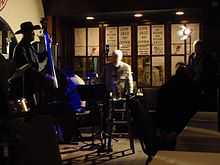Butch Warren

Edward "Butch" Warren (August 9, 1939 – October 5, 2013)[1] was an American jazz double bassist who played in the hard bop genre. He was especially active in the late-50s and the 1960s.
Biography
Warren began playing professionally at age 14 in a local Washington, D. C. band led by his father, Edward Warren. He later worked with other local groups, including Stuff Smith's[2] as well as with altoist and bandleader Rick Henderson at the historic Howard Theatre on 7th and T Streets.[3]
In 1958, he moved to New York City to play with Kenny Dorham, appearing on his first recording, with Dorham, in January 1960 with saxophonist Charles Davis, pianist Tommy Flanagan and drummer Buddy Enlow.[3] He stayed in New York for the rest of his musical career, mainly as house bassist for Blue Note records.[4]
As sideman, he also recorded with Miles Davis, Hank Mobley, Donald Byrd, Sonny Clark, Dexter Gordon, Herbie Hancock, Joe Henderson, Jackie McLean, and Stanley Turrentine. He played with Thelonious Monk in 1963 and 1964 and then moved back to Washington, D.C., where he briefly worked in television before becoming seriously ill.[4]
Following the onset of his illness he played professionally only occasionally, including a regular gig at the jazz club Columbia Station in Washington D.C.'s Adams Morgan neighborhood.[5]
His solos were inventive, occasionally using the bow. His only solo effort was captured on "Butch's Blues" but is better known as a sideman on many albums, including Dexter Gordon's Go,[6] Jackie McLean's Vertigo (1959) and Hipnosis (1967), and many recordings with Thelonious Monk. His most memorable contribution was on Herbie Hancock's "Watermelon Man", on Hancock's debut album, Takin' Off (1962).
Discography
As sideman
- 1959: Vertigo - Jackie McLean
- 1960: Jazz Contemporary - Kenny Dorham
- 1961: Leapin' and Lopin' - Sonny Clark
- 1961: Royal Flush - Donald Byrd
- 1961: High Hope! - Elmo Hope (Beacon)
- 1961: Free Form - Donald Byrd
- 1962: Takin' Off - Herbie Hancock
- 1962: Go - Dexter Gordon
- 1962: Preach Brother! - Don Wilkerson
- 1962: Jubilee Shout!!! - Stanley Turrentine
- 1962: A Swingin' Affair - Dexter Gordon
- 1962: Feelin' the Spirit - Grant Green
- 1963: No Room for Squares - Hank Mobley
- 1963: Happy Frame of Mind - Horace Parlan
- 1963: Exultation! - Booker Ervin
- 1963: A New Perspective - Donald Byrd
- 1963: Page One - Joe Henderson
- 1963: The Turnaround - Hank Mobley
- 1963: Miles & Monk at Newport - Thelonious Monk
- 1963: Una Mas - Kenny Dorham
- 1963: Straight No Filter - Hank Mobley
- 1964: It's Monk's Time - Thelonious Monk
- 1964: Holiday Soul - Bobby Timmons
- 1967: Hipnosis - Jackie McLean
References
- ↑ "Edward ‘Butch’ Warren, Washington-born bassist, dies at 74". The Washington Post. Retrieved 6 October 2013.
- ↑ Scott Yanow at allmusic
- ↑ 3.0 3.1 All about jazz
- ↑ 4.0 4.1 "Decades of Discord Lie Between a Man and His Music" by Marc Fisher. Washington Post Sunday, May 21, 2006;
- ↑ Raw Fisher by Marc Fisher. Washington Post July 26, 2007;
- ↑ allmusic review
External links
|